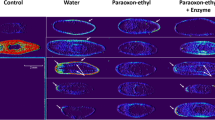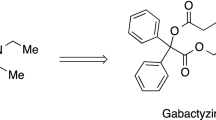Abstract
DURING the War, the Germans introduced as insecticides a series of phosphate esters, including tetraethylpyrophosphate and hexaethyltetraphosphate. From information supplied to us by Mr. B. Topley, it appears probable that both these materials, in the form in which we have used them, were, in fact, mixtures of substances with the empirical composition implied by their names; in any event, it is certain that hexaethyltetraphosphate is almost instantaneously largely hydrolysed in water into simpler bodies. In toxicity tests1,2 a characteristic syndrome of hyperexcitability, twitching, salivation and convulsions, has been noted with doses of 1–3 mgm./kgm. Dubois and Mangun2,3 showed that these compounds are potent anticholinesterases; they are more active than diisopropylfluorophosphonate in the rat both in vitro and in vivo; this finding has been confirmed on the American roach4.
This is a preview of subscription content, access via your institution
Access options
Subscribe to this journal
Receive 51 print issues and online access
$199.00 per year
only $3.90 per issue
Buy this article
- Purchase on Springer Link
- Instant access to full article PDF
Prices may be subject to local taxes which are calculated during checkout
Similar content being viewed by others
References
Deichman, W. D., and Withering, S., Fed. Proc., 6, 322 (1947).
Dubois, K. P., and Mangun, G. H., Proc. Soc. Exp. Biol. Med., 64, 137(1947).
Mangun, G. H., Fed. Proc., 6, 353 (1947).
Chadwick, L. E., and Hill, D. L., J. Neurophysiol., 10, 235 (1947).
Chennells, Mary, and Wright, Samson, Nature, 180, 503 (1947).
Schweitzer, A., Stedman, E., and Wright, Samson, J. Physiol., 96, 302 (1939).
Author information
Authors and Affiliations
Rights and permissions
About this article
Cite this article
BURGEN, A., KEELE, C., CHENNELLS, M. et al. Physiological Effects of Alkyl Polyphosphates. Nature 160, 760–761 (1947). https://doi.org/10.1038/160760a0
Issue Date:
DOI: https://doi.org/10.1038/160760a0
This article is cited by
-
Pharmakologische Wirkungen auf die Selbststeuerung des Blutdruckes
Naunyn-Schmiedebergs Archiv f�r Experimentelle Pathologie und Pharmakologie (1951)
Comments
By submitting a comment you agree to abide by our Terms and Community Guidelines. If you find something abusive or that does not comply with our terms or guidelines please flag it as inappropriate.



